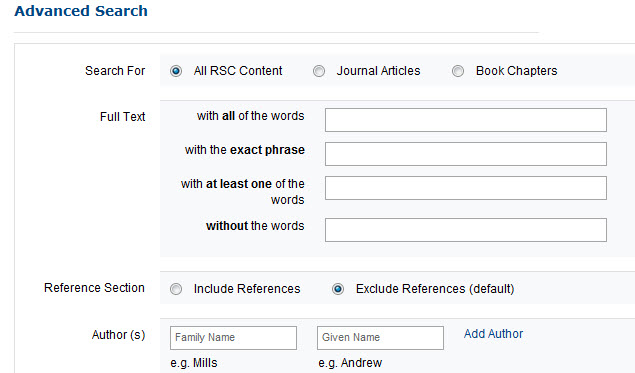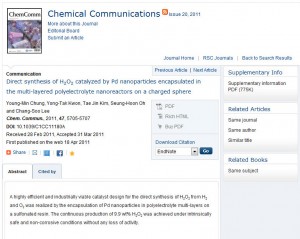 *
*
This blog provides important and relevant information on the RSC Publishing Platform migration, training, Highlights, OCLC MARC records and changes to free access content.
= = = = = = = = = = = = = = = = = = = = = = = = = = = =
RSC Publishing Platform Timescales
= = = = = = = = = = = = = = = = = = = = = = = = = = = =
| Date |
Notes |
| |
|
| By end of July 2011* |
IMPORTANT
- Set up a Librarians’ Portal account
for your institution/organisation to access additional administration tools
GO TO www.rsc.org/librarylogin
- Set up a usage statistics account
for your institution/organisation if you don’t have one for your RSC Publishing journals and eBook Collections
GO TO www.rsc.org/usageform
Alternatively, email us for any queries or more information
EMAIL technicalsupport@rsc.org |
| By end of July 2011* |
- Set up at least one Librarians’ Portal account for use by yourself or your team
- Our usage statistics customers will continue to access statistics from MPS however, you will link through the Librarians’ Portal later in the year so it is important to have a Librarians’ Portal account so we can match it to your MPS usage statistics account
GO TO www.rsc.org/librarylogin |
*Dates subject to change
Contact Technical Support with any technical issues
EMAIL technicalsupport@rsc.org
= = = = = = = = = = = = = = = = = = = = = = = = = = = =
RSC Publishing Platform Training
= = = = = = = = = = = = = = = = = = = = = = = = = = = =
Are you interested in receiving RSC Publishing Platform or ChemSpider training? Please email myself, Louise Peck, so I can organise this for you
EMAIL peckl@rsc.org
= = = = = = = = = = = = = = = = = = = = = = = = = = = =
RSC Publishing supplying OCLC MARC records to our eBook customers for free
= = = = = = = = = = = = = = = = = = = = = = = = = = = =
Last year, we did a survey to the library community through listservs asking your views on MARC records. Thank you very much for your feedback, which has been very beneficial – we now have some exciting news as a result:
RSC Publishing is very pleased to announce that we have now signed an agreement with OCLC to supply all our RSC eBook Collection and Subject Collections customers with OCLC MARC records free of charge.
OCLC WORLDCAT COLLECTION SETS SERVICE
To sign up to receive these MARC records through the OCLC WorldCat Collection Sets Service
GO TO http://collectionsets.oclc.org/JustLooking?cmd=displayElectronicSets
OCLC AUTHORISATION NUMBER AND PASSWORD
If you have an OCLC authorisation number and password, you can use the online form
GO TO http://collectionsets.oclc.org/JustLooking?cmd=requestLogin
DON’T HAVE AN OCLC AUTHORISATION NUMBER?
If you don’t have an OCLC authorisation number, you may submit the PDF version of the form and either fax or mail it to OCLC. You will not be making any payments for RSC Publishing MARC records – these are at cost of us.
GO TO http://collectionsets.oclc.org/forms/wcs_orderform.pdf
If you have any queries regarding the OCLC process, please
EMAIL orders@oclc.org
If you have any additional queries, please contact us and we will happily help
EMAIL technicalsupport@rsc.org
= = = = = = = = = = = = = = = = = = = = = = = = = = = =
Register for RSC Publishing Platform Updates
= = = = = = = = = = = = = = = = = = = = = = = = = = = =
Subscribe to this RSC Publishing Innovation Blog RSS feed that appears in the Librarians’ Portal news
GO TO https://blogs.rsc.org/technical/feed
= = = = = = = = = = = = = = = = = = = = = = = = = = = =
Highlights
= = = = = = = = = = = = = = = = = = = = = = = = = = = =
These free RSC Publishing supplements have moved:
Since January 2011, all online news articles are published on the Chemistry World news page
GO TO www.rsc.org/chemistryworld
They are still free for everyone to access. Plus, a selection of the content will be published in print as part of the Research section of Chemistry World. The original RSC Publishing research, on which the articles are based, will be free for a limited time.
- Issue 12, 2010, was the final issue of each of the three supplements
- All published issues will be freely accessible from the RSC website.
Originally launched back in 2004 to provide a news service drawing together coverage from all RSC publications, the supplements have provided a vehicle for wider promotion of the most cutting-edge science published in RSC journals. By moving to Chemistry World, articles will have the opportunity to reach even wider audiences.
Make sure you keep in touch with the latest RSC Publishing research news
Follow us on Twitter
Sign up for the Chemistry World daily, weekly or monthly alert:
GO TO www.rsc.org/newsletters
= = = = = = = = = = = = = = = = = = = = = = = = = = = =
Changes to Free Access Content
= = = = = = = = = = = = = = = = = = = = = = = = = = = =
All RSC Publishing customers and those on free trials with registered IP addresses no longer need to request to receive our free access journals – this is now provided to you automatically.
This means your students, academics, scientists, researchers and professionals can now access free content available on the RSC Publishing Platform when going through your institution or organisation authentication.
Free access content includes:
- Any articles that are part of a special free access promotion
- A sample chapter from each book in the RSC eBook Collection
- All content of our newest journals for the first two volumes.
For 2011 this includes:
- Catalysis Science & Technology
- Chemical Science
- Food & Function
- MedChemComm
- Polymer Chemistry
- RSC Advances (just announced)
If you are not an RSC Publishing customer, are not part of a free trial to our content or don’t have your IP address registered with us, request access to this free content
GO TO www.rsc.org/libraryfreeaccess
= = = = = = = = = = = = = = = = = = = = = = = = = = = =
Useful URLs
= = = = = = = = = = = = = = = = = = = = = = = = = = = =
RSC Publishing Online Platform Video:
GO TO www.rsc.org/platformvideo
Migration Support:
GO TO www.rsc.org/migration
RSC Publishing Platform:
GO TO www.rsc.org/platform
Librarians’ Portal:
GO TO www.rsc.org/librarians
If you would like further customer or technical support:
EMAIL sales@rsc.org
EMAIL technicalsupport@rsc.org
Thank you for your time.
Kind regards


Louise Peck, Library Marketing Specialist
Royal Society of Chemistry, Thomas Graham House,
Science Park, Cambridge, CB4 0WF, UK
technicalsupport@rsc.org

Comments Off on RSC Publishing Platform Update
















